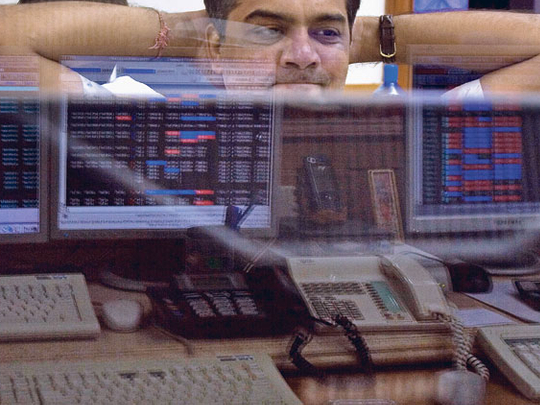
Mumbai: After sliding for two consecutive weeks, Indian shares should see a relief rally, with support coming from a US economic rebound and accelerating growth at home.
The Reserve Bank of India (RBI) held interest rates as expected at its policy meeting on Friday, but surprised markets by raising the cash reserve of ratio (CRR) by a stiff 75 basis points, a move that will lower the amount of bank deposits available for loans by Rs360 billion (Dh3 billion).
The index representing major bank shares on the Mumbai stock exchange rallied three per cent after the policy as the CRR increase was unlikely to put pressure on profit margins because banks have been sitting on huge idle deposits due to sluggish loan growth.
"This is the right approach given that they have to balance the conflicting objectives of curbing rising inflationary pressures and supporting economic recovery," said Meera Sanyal, country executive for India at ABN AMRO Bank, referring to the RBI policy.
"An increase in CRR is unlikely to put pressure on lendng rates given low credit off-take and recourse to non-bank sources of funding," she said.
Projection
The central bank raised India's gross domestic product's growth forecast to 7.5 per cent in 2009-10 from its earlier projection of around 6 per cent, but indicated it was too early to proclaim a greater degree of confidence.
"Whereas we have been saying recovery is in place ... it is still uneven," Subir Gokarn, a deputy governor of the RBI, said. "That is really what in our calculations was the strongest argument against hike of rates."
With data late on Friday showing the US economy expanding at a crisp 5.7 per cent in the fourth quarter, the fastest pace in more than six years, there will be more optimism brimming when the market opens for trade tomorrow, traders said.
"I'd expect a gap-up start of more than 100 points," said equity trader Anmol Dalal. "We have had a consolidation and there's fuel in the tank. So, you should see some people stepping on the gas."
The top-30 Sensex fell almost 3 per cent last week, taking losses over two weeks to about seven per cent. The widely tracked index plummeted 6.3 per cent in January, its monthly biggest fall since October, to 16,357.96.
Foreigners have pulled out a net $1.65 billion over the seven trading sessions to Thursday, data from the Securities and Exchange Board of India showed, which largely contributed to the stocks fall. In 2009, the funds had bought $17.5 billion (Dh64.2 billion) of stocks and helped the Sensex jump 81 per cent.
Market sentiment should perk up with US President Barack Obama toning down the threat of clamping down on risk-taking by banks, a concern which had weighed heavily on world markets over the past two weeks.
China's move to tighten bank loans had also unnerved investors across the world on worries it could cool growth in the giant economy and hit other regions. But on Friday, the People's Bank of China soothed markets saying it would stick with "appropriately loose" monetary stance and ensure adequate money for loan growth.
The central bank also said that although there was price pressures it was optimistic inflation would remain under control. "Overcapacity in some sectors and a sufficient supply of consumer goods will also help to curb price rises," it said.
Investors in India will now shift their focus to the upcoming annual budget that will be presented to parliament on February 26. For its part, the RBI signaled the government should start rolling back stimulus measures that were put in place to lift the economy from the global slowdown caused by the world financial crisis in 2008.
"We think the Reserve Bank of India has put the onus on the government to lower its deficit, both in terms of revenues and expenditure compression to make monetary policy more effective," Citigroup analysts Rohini Malkani and Anushka Shah said in a note.
The writer is a journalist based in India.












